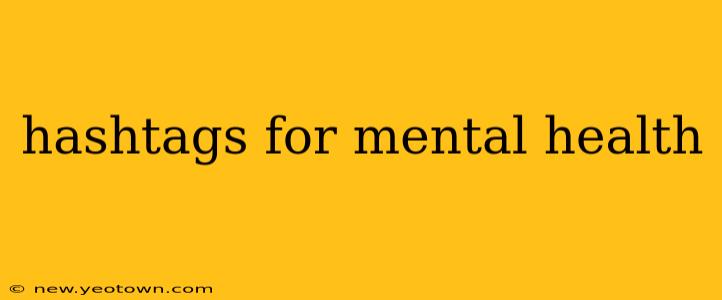The internet has become a powerful tool for connection, and for those navigating the complexities of mental health, finding supportive online communities is crucial. Hashtags act as digital signposts, connecting individuals with shared experiences and resources. But choosing the right hashtags can feel overwhelming. This isn't just about picking popular tags; it's about finding the ones that resonate with your specific needs and intentions. Let's embark on a journey through the world of mental health hashtags, exploring their nuances and uncovering their power.
What Makes a Good Mental Health Hashtag?
A truly effective hashtag isn't just about popularity; it's about relevance and community. Think about your specific experiences and what you hope to achieve by using hashtags. Are you looking for support, sharing your story, finding resources, or raising awareness? This will guide your selection. A good hashtag is:
- Specific: Instead of #mentalhealth, consider #anxietyrelief, #depressionawareness, or #bipolarjourney. Specificity attracts a more targeted audience.
- Supportive: Choose hashtags that promote understanding and empathy, avoiding those that might stigmatize or trivialize mental health challenges.
- Action-oriented: Hashtags like #mentalhealthtips, #selfcaresunday, or #findyourstrength can encourage engagement and participation.
- Community-focused: Look for hashtags associated with specific groups or causes, like #LGBTQmentalhealth or #veteransmentalhealth. This helps you connect with people who understand your unique experiences.
Finding the Right Hashtags for Your Needs
The landscape of mental health hashtags is vast, and the right ones depend on your individual journey. Here are some categories to explore:
General Mental Health Awareness:
- #mentalhealthmatters: A broad but essential tag emphasizing the importance of mental well-being.
- #mentalhealthawareness: Used to raise awareness about various mental health conditions.
- #youarenotalone: A powerful message of solidarity and support.
- #mentalwellness: Focuses on proactive strategies for maintaining good mental health.
- #mentalhealthsupport: A clear signal seeking help and connection.
Specific Mental Health Conditions:
- #anxiety: For individuals experiencing anxiety and related disorders.
- #depression: For sharing experiences and finding support related to depression.
- #bipolar: Connecting with others living with bipolar disorder.
- #PTSD: For veterans, survivors of trauma, and others impacted by PTSD.
- #OCD: For individuals with obsessive-compulsive disorder.
- #ADHD: For those with attention-deficit/hyperactivity disorder.
- #eatingdisorders: A sensitive topic requiring careful and supportive engagement.
Self-Care and Coping Mechanisms:
- #selfcare: Encompassing a wide range of self-care practices.
- #mindfulness: For practices like meditation and present moment awareness.
- #stressmanagement: Techniques for coping with stress and anxiety.
- #selfcompassion: Promoting kindness and understanding towards oneself.
- #mentalhealthrecovery: Sharing journeys of healing and recovery.
Support and Community:
- #mentalhealthcommunity: Connecting with others facing mental health challenges.
- #mentalhealthadvocate: For those actively working to improve mental health awareness and support.
- #endthestigma: Working towards reducing the stigma associated with mental health conditions.
Using Hashtags Effectively
Don't just throw hashtags into a post randomly. Consider:
- Research: Check out the existing content using a hashtag before using it yourself. Does it align with your message and goals?
- Moderation: Don't overload your posts with too many hashtags. A few relevant ones are more effective than a long, unwieldy list.
- Context: Ensure the hashtags you use accurately reflect the content of your post.
- Engagement: Engage with others who are using the same hashtags. Building connections is a key benefit of using hashtags.
Beyond Hashtags: Seeking Professional Help
While hashtags are a valuable tool for connection and support, they are not a replacement for professional help. If you are struggling with your mental health, please reach out to a mental health professional. There are numerous resources available to help you find the support you need.
This journey through the world of mental health hashtags is just the beginning. By thoughtfully selecting and using hashtags, you can tap into supportive communities, share your experiences, and contribute to a more understanding and compassionate world. Remember, you are not alone.

